Massage by Bi Feiyu
Translated by Howard Goldblatt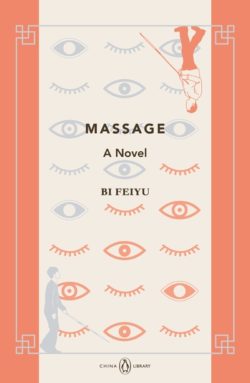
Penguin China 2015
Publisher's Blurb
A stunning portrait of disability and the strength of human character.
Wang Daifu is a sought-after blind practitioner of tuina, traditional pressure-point massage. His is a uniquely coveted skill, yet it is one of the few options open to the visually impaired in China. When he loses all his savings on the stock market, he returns to his provincial hometown to rebuild his life. His fiancée Xiao Kong accompanies him, but pressure quickly builds in their relationship as expectations collide, leading to choices that Wang Daifu never thought he would have to make.
Reading Chinese Network Reviews
Reviewed by Sam Hall, 22/4/18
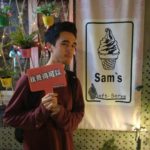 My experience reading the English translation of Bi Feiyu’s much acclaimed novel, Massage, began in delight and ended in frustration and tedium. This is, at least in part, due to the false expectations created by the book’s prologue.
My experience reading the English translation of Bi Feiyu’s much acclaimed novel, Massage, began in delight and ended in frustration and tedium. This is, at least in part, due to the false expectations created by the book’s prologue.
Dryly entitled ‘Defining the Terms’, the prologue begins by employing a rather emotionally detached, expository voice to outline the basic dynamics of a typical patron-client relationship at a traditional Chinese massage salon. This relationship essentially involves blind massage therapists using various non-visual cues to sizeup and assess the social standing of their sighted clients. The introduction of the salon’s operating manager, Sha Fuming, lends these general descriptions both levity and focus by demonstrating how a seasoned therapist gathers sensory information to appraise both the physical and emotional needs of a client. This is a delightful opening hook that pithily captures the basic premise of novel: that through close, dispassionate attention to the world of the blind and all of the asymmetries it forms with our own sighted experience, we might gain more fundamental insight into how interpersonal relationships shape our sense of self-worth and dignity.
Since prologues are themselves usually somewhat adjunct to the main body of work, I thought it reasonable this opening section sought to simply set the scene with little emotional involvement. But this also came with the expectation that character depth and plot would build throughout the rest of the novel. Instead, the novel maintains a narratorial distance to its characters that feels periscopic, and basically eschews any sense of plot. It is this disjunct -between the abiding expectation of a story in the offing, and the reality of what seems to be participant-observation anthropology loosely cloaked in fiction – that makes Massage so frustrating.
Nevertheless, I was deeply impressed by some of the insights Bi that was able to get into blind culture. In particular, I found the parallels between how blindness is politicised in China and how ‘black’ identity is politicised in the USA very intriguing. For example, when Sha Fuming assumes a managerial, as opposed to a therapist, position at the salon, it is noted that “[he] was becoming more like a sighted man in the way he talked and dealt with people. He was becoming somebody”. The social and professional hierarchy clearly favours the sighted and their habitus. Numerous times throughout the novel, it is made clear that the blind feel self-conscious and inferior when in the presence of the sighted (especially in certain contexts, such as when walking or travelling, that highlight their disability). Even more interestingly, for a blind person to adopt the habitus of the sighted seems to be regarded as an act of betrayal to one’s own in-group, as another character, Wang, makes clear in his admonishment of Sha: “You’re acting more and more like a sighted person. And I don’t like that.” The parallels with the dynamics between black and white American cultures continue when we find out that, much like the ‘N-word’, “The blind do not treat the word ‘blind’ as a taboo, and often use it themselves, sometimes in a jocular manner. But they tend to be more sensitive with outsiders”. It also becomes clear that the sighted world dominates the blind’s own hierarchy of epistemology. They care very much about gleaning information on others’ appearances, but in this way are almost completely beholden the judgements of the sighted. This becomes particularly salient when a famous director visits the salon and dramatically praises one of the female therapists for her stunning beauty. Sha Fuming is so taken by the director’s praise that he becomes obsessed with trying to understand the woman’s visual beauty – a task that, as a blind man given to pure ideation, he pursues in total vain.
Indeed, the praise Bi has received for the work mainly centres around the fact that he has succeeded in providing an account of disability that largely avoids condescension and pity. And these features of the work are undoubtedly intriguing, but I would argue aren’t quite sufficient proof of the work’s literary merit. For example, Bi seems intent on chronicling the minutiae of blind therapists’ experiences as they interact with the world, but because he introduces too many characters with too little interiority and depth, he fails to imbue the mundane with meaning. The narrative feels listless and inconsequential as a result. Bi’s metaphors, too, are often a little overwrought while the cadence of his sentences is also wearingly repetitive and monotonous. Perhaps the help of a good editor would brought literary focus and energy to Bi’s unique insights into the world of the blind. That said, there is the chance, of course, that my Western aesthetic sensibilities are simply unaccustomed to dealing with so many loose strands (cf. the focused versus dispersed kinds of perspective, and literary narration, in Western and Chinese aesthetics, respectively).
Reviewed by Sam Hall
Reviewed by Stephanie Boote, 27/2/18
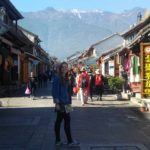 In Massage, Bi Feiyu tells the story of a community of blind massage therapists living in the Sha Zongqi tuina centre. Throughout the novel, complicated and nuanced characters whose struggles go beyond the effects of their mutual disability, build up to a palpable tension with a devastating breaking point.
In Massage, Bi Feiyu tells the story of a community of blind massage therapists living in the Sha Zongqi tuina centre. Throughout the novel, complicated and nuanced characters whose struggles go beyond the effects of their mutual disability, build up to a palpable tension with a devastating breaking point.
On first reading Massage I felt slightly misled by the book’s blurb, which implies that the novel will primarily be concerned with Wang Daifu as the primary protagonist. Instead I was surprised to find an ensemble piece unveiling itself as the book progressed. The misconception of a single character focus is actually emphasised in the very titles of the chapters themselves. Naming each chapter for an individual character, or in one case specific relationships, implies that each character’s story is limited to the chapter which contains their perspective. However, this too is a distortion of the true narrative. Despite the strictly regimented chapters, various perspectives and important character moments diffuse through the book. This is particularly evident in chapter twenty. Although dutifully named after Sha Fuming the chapter contains a defining moment for Xiao Kong, told from her perspective and declaring the culmination of her character arc. The fact that the chapter then concludes with the narrative focus being redirected to the larger matter which affects the whole community is also important. The reason I draw such attention to the way the structure of the book contrasts the substance of the story is because it undermines a united, flawed assumption which all of the characters themselves believe – that they are alone.
When all is said and done the real focus of the story is the tuina centre itself. The tuina centre brings these people together so that they can support themselves and without it the story could not take place. In the preface great importance is given to ensuring that the reader understands the relationship between the sighted clients and the blind therapists, therefore bringing attention to how the blind therapists participate with the world around them. Introduced descriptively before any other character, the centre is of unique importance. Throughout the novel it is established that any kind of change in management would be devastating for the people inside. Towards the end of the book even the very architecture of the centre itself (more specifically, the doors) has a direct influence on the plot of the novel. The peace which exists within its walls is a fragile one, any departure or falling out causes a ripple effect which ruptures other character’s livelihoods. This tension is then supported by the structure of the centre itself. Particularly as the male and female dorms provide little to no freedom for couples and massage therapists often find privacy in the rooms in which they work, thus providing little to no work/life balance. This oppressive environment causes the characters to retreat further into their personal lives, intensifying their internal pressure despite the relief that communication would bring.
The centre’s provision of a community and the characters’ stubborn obliviousness to their place in it provides a sense of irony. Each of the characters struggles to communicate with the people around them, not only due to their lack of sight but due to a lack of trust and a deep sense of pride. Misunderstandings abound and personal problems are stubbornly kept private, even in the most intimate relationships. The clearest example of this is in the relationship between Xiao Kong and Wang Daifu. Whilst he is convinced that her increasing unhappiness is caused by his inability to provide a life for her as a boss’s wife, it is in fact revealed to be due to a lie she is maintaining with her parents. The tension created between the couple could be solved with a conversation and yet they instead choose to continue without ever sharing their dilemmas. It is no coincidence in my mind that Xiao Kong’s story – one of the only stories to be brought to a satisfying conclusion – is only brought to a close because she shares it with a close friend who is then able to help her. The final chapter of the book effectively hammers this point home, the remaining characters are confronted with the reality of their connection to the people within their community and the consequences of not recognising their subsequent responsibilities. This ultimately forces them to recognise the need to learn to trust and know each other. One of the final images is of the remaining characters holding hands to approach an uncertain future together, as the supportive community they have always had the potential to be.
The abrupt ending of the book, right as the tension peaks and without wrapping up each character’s story with a satisfying conclusion, is disconcerting. The reader is left in the same position as the characters themselves, wondering what on earth is going to happen to them. Many characters are simply removed from the book; slipping away, bundled onto trains or arrested just as it seems as though they have achieved a life changing insight. As frustrating as this can be, it still serves to emphasise the importance of the whole community as opposed to the individual character. The book closes prioritising its most important concern, the ultimate survival of the tuina centre and whoever remains in it’s community.
On the whole I thoroughly enjoyed Massage and would happily recommend it as a story which gives voice to an often disregarded presence in Chinese society.
Reviewed by Stephanie Boote
Reviewed by Barry Howard, 20/2/18
 Half a dozen of my fellow “Reading Chinese Network” book reviewers have already posted positive reviews of this book, so that leaves me as the odd one out. As to the translator, Howard Goldblatt, there may be mixed views but I’ve always appreciated the neutrality of his English and how it lends a behind the scenes quality to an author’s work. Without translators there is no show, but I don’t expect (nor want) them to appear on stage.
Half a dozen of my fellow “Reading Chinese Network” book reviewers have already posted positive reviews of this book, so that leaves me as the odd one out. As to the translator, Howard Goldblatt, there may be mixed views but I’ve always appreciated the neutrality of his English and how it lends a behind the scenes quality to an author’s work. Without translators there is no show, but I don’t expect (nor want) them to appear on stage.
For me, Massage stumbled under a multitude of characters and a lack of focus. It reads like a succession of short stories that blend into each other, failing to build up sufficient momentum towards any particular place. The book is marketed as a “portrait of disability”. However, as far as I’m aware the author was primarily interested in the interactions between blind people rather than wanting to promote a better understanding of living without sight.
I question whether we really gain an insight into the life of any blind person, beyond the obvious (although that should really be addressed to the marketers, rather than Bi Feiyu). By contrast, Sheng Keyi’s Northern Girls took me into the same world of migrant workers in the booming cities of early 21st century China (but focussing on women). And in Mark Haddon’s The Curious Incident of the Dog in the Night-Time we’re shown how a disabled person (with Asperger’s) makes sense of, and navigates, the everyday world we think we know.
The blind tuina practitioners are more representative of the working classes than of the disabled. They are part of the mass migration typical of any country as it moves from an agricultural to an industrial society. They also show how the move from a command to a capitalist economy leaves individuals responsible for all aspects of their lives, including exposure to risk (as displayed by job insecurity, volatile stock markets and property speculation).
There are oddments of China-specific subjects. We see the lack of privacy, where work places are like extensions of a college campus (communal eating, dormitories and shared facilities). The author also appears to raise issues with his original Chinese audience. Inevitably (as is the penchant of Chinese intellectuals) ‘face’ will raise its head. It’s an important part of Chinese culture, but it shouldn’t always be portrayed as ugly. Whilst a sensitivity to how one is perceived by others may be negative, sensibilities over how another may be perceived is not.
Also addressed (to varying degrees) are the limits of Chinese medicine, romantic obsessions, the desire for sons, and Latinised Chinese (once a serious idea, now an insult to national pride). We are further made aware of the difficulties some Chinese have with their national language – imagine Europe as one country with Italian as it’s national language, and then consider how disadvantaged an Estonian would be compared to a Romanian.
So Massage runs over all this, as a community of blind workers in the midst of an industrial and economic revolution practice a traditional element of Chinese medicine. And therein, for me, lies its problem. Whilst the breadth of issues should give something of interest for everyone, depth is lacking.
Reviewed by Barry Howard
Reviewed by Paul Woods, 8/10/17
 Massage focuses on a group of blind, Chinese, masseurs and masseuses, a specific group who are effectively invisible to mainstream society; those who cannot see end up not being seen. It is the story of the staff of a massage centre and the complicated relationships which form, develop, fracture, and reform among them.
Massage focuses on a group of blind, Chinese, masseurs and masseuses, a specific group who are effectively invisible to mainstream society; those who cannot see end up not being seen. It is the story of the staff of a massage centre and the complicated relationships which form, develop, fracture, and reform among them.
The massage centre has two bosses with different personalities and giftings, one hands-on and the other more distant. Eventually factors beyond their control lead to disunity within the staff and considerable challenges for the running of the business. Throughout the story there are shifting interpersonal and romantic relationships, as well as unrequited love and jealousy. Although the blurb on the back of the book places the focus on Wang Daifu and his fiancée, as the story unfolds almost all of the characters have equal weight and Wang serves more as a pair of bookends and perhaps as a unifying thread to the narrative.
For me, the genius of the story and its author lies in the combination of the particular and the universal. As the story unfolds, we see that the strengths and weaknesses, and dignity and vices of the blind are very much mirrors of the mainstream, sighted community. In the English translation, seeing verbs used of the blind are initially italicised. As the reader follows the story he or she sees (pun intended) a portrait not only of the lives of the blind, but also of human nature generally. In addition, while this is a very Chinese story, and Bi is honest and objective about his own culture, readers from any heritage can see themselves and their own people in the narrative. Although the protagonists are blind, with genuine limitations in life and work, they do not always see themselves as victims. By way of balance, Bi reveals how the blind view the sighted, and we feel their impatience with and even sense of superiority to the sighted. Indeed, in a moment of anger Wang accuses his fiancée with: ‘You don’t deserve to be blind!’
In almost every main character pride is portrayed as a weakness. There is pride about one’s ability as a boss, as a masseur, as a lover, as a young person, as an older person, and so on. Although this is manifest in different ways through specific roles and relationships, I found myself wanting to speak to each person and urge them to move on and drop their pride. They could have handled their difficulty and issues much better if they had shown a little humility.
Many sighted people would probably not imagine, or would not have taken time to reflect on how those considered unfortunate could show pride and arrogance. The story reveals the essential, flawed humanity that we all share, whether we can see or not. Bi’s character development is, not surprisingly, outstanding. He provides rich and rounded backgrounds for each main character and develops these through the unfolding relationships and by taking us into the world of their imagination. The book is rewarding in that the reader enters the world not only of the blind, but also of individual people, with their foibles and convoluted experiences and desires. The exploration of those born blind and those who lost their sight later is powerful and moving.
The main chapters in the book are named after people, and the story has a slightly segmented feel within the overall account of life in the massage centre. The English translation reads very well, yet the essential Chineseness of the story and its setting are preserved. I did wonder why the prostitute Xiaoman is romanised as one word while other names follow the form Xiao Kong. Although the book is long at over 300 pages, and there are extensive descriptions and developments of the characters, I felt sometimes as if I were reading a short story; there is an emphasis on events and some questions and issues are left unresolved. For me the book ends rather abruptly and the reader is left to continue the story in his or her own mind. We hope that Wang will eventually marry Xiao Kong and find a way to open his own massage centre, and that Boss Sha and Boss Zhang will resolve their differences. Those injured, physically and emotionally, did not find resolution in Bi’s story and their fate rests with us as we put the novel down.
Massage is a treat: an insight into a community very foreign to most of us and yet a microcosm of human nature. It moves quickly but with attention to detail and feelings. Bi Feiyu manages to entertain and educate at the same time.
Reviewed by Paul Woods.
Reviewed by Henry Wang, 7/10/17
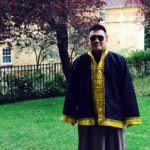 According to statistics, China’s disabled population equals the entirety of Britain or France, and among them approximately 20%, 17 million visually impaired citizens, are having a lovely or lousy day exactly the same as you or me, without being able to see. However, the plight of this marginalised community has been neglected, apart from some privileged expressions of sympathy, until Bi Feiyu, a former trainer in special education, before switching career and becoming an independent writer and university scholar. This change followed a serious shoulder injury, and subsequent visit to a blind massage clinic.
According to statistics, China’s disabled population equals the entirety of Britain or France, and among them approximately 20%, 17 million visually impaired citizens, are having a lovely or lousy day exactly the same as you or me, without being able to see. However, the plight of this marginalised community has been neglected, apart from some privileged expressions of sympathy, until Bi Feiyu, a former trainer in special education, before switching career and becoming an independent writer and university scholar. This change followed a serious shoulder injury, and subsequent visit to a blind massage clinic.
At that moment, the catalyst for Massage appeared. Although all these experiences fed into the story and gave it enough authenticity, it is worth mentioning that Bi's cast of characters do not define themselves by their visual impairment. Neither a utopian picture of the blind nor one of despair has been delicately painted here. Instead, we discover a group of real people getting on with their lives as best they could with human issues: joys, worries, hatred, desires, sexual longings, ambitions, and jealousies.
The loosely structured but horizontal plus vertical axes of storytelling follow the staff and management at Sha Zongqi Tuina Massage Center, where all of the therapists are blind. Bi is wise not to act as an omniscient narrator, neither condescending nor glorifying from his perspective which wavers between with the first and third person. While Massage was not written to raise awareness, per se, this has been a direct side effect– it helped put social issues on the map that are so often brushed under the carpet. The topic of blind masseurs raises questions concerning cultural beliefs about the community and their social treatment. Is becoming a therapist the only appropriate career option open to the blind? What kinds of social and financial support have been provided for blind people in China?
The story follows the lives of 15 blind tuina practitioners. This is almost a book consisting of interlocking short stories, as we dip in and out of lives, and story arcs merge then separate. Rather than a central narrative, horizontally, Bi opens like classical Chinese fiction writers - he arranges most of protagonists to turn up in the opening chapters, followed by their personal struggles and love stories with backstage narratives of how and when each person became blind: Xiao Ma's sexual repression with feelings of guilt and shame until he met escort girl Xiao Man; or Wang Daifu’s self-destructive defiance of criminal intimidation. Vertically, Bi clearly prioritizes the exploration of character psychology over narrative progress.
Thereby, the compensatory senses of touch and smell have also been tactfully manifested in some ways. Although the Chinese language perpetuates vulgarity, Bi as well as his skilful translators, still manages to brush, knead, roll, press, and rub readers' acupressure points with powerful lexical devices, in a rather subtle, feminist approach.
...they experience two worlds that meet at a special place called purgatory. Not all of them manage to pass through it. At the entrance, they undergo the torment of internal chaos and turmoil, a manic process marked by fierce temper, so cruelly overwhelming that only ruins are left. In the deepest crevice of memory, each of them has not lost his world, only his connection with the world, but without which the world has suddenly become deep, hard and distant...(Chapter 3 Xiao Ma, pp.46)
The blind must use the assumptions of the sighted to build their worldview. The blurry, slightly darkness gives them forever no response.
The unfavorable living conditions, dignity, and dislocation are the three main themes I sketched from Massage. All 15 fringes of the group suffer from complete or nearly complete vision loss, either from birth or coming later as a result of injury. Yet blindness has shaped these people and given them a specific insecurity and self-reliance. Wang Daifu and Xiao Kong's engagement was stymied by her parents’ refusal to let her marry another blind man. Zhang Zongqi, the co-owner of the tuina center, has a childhood fear of being poisoned from his wicked stepmother. Jin Yan who had spent her last years of sightedness watching every film and reading every book she could find that featured a wedding: her later days are all hysterically obsessed with a romantic wedding day.
Although far from ease and light, the blind community in and beyond Massage have a profound sense of personal dignity. Generosity, sympathy, any hypocritical social attitude is certainly scathing towards them. Only the one who has truly experienced loss can actually feel. They are particularly venerable and sensitive, to what extent being considered brave could be equal to being demeaned. Du Hong abandons the life of a musical prodigy because she knew the audience's standing ovation, their applause, was only linked to her awful impairment but not her screwed up playing. “Why should the blind need more dignity than the sighted? We force so many things upon ourselves. There is only human dignity, never dignity belonging only to the blind.” In modern China when the Confucian literati style of dignity has become diminished and gradually extinguished, it is blind people who treasure their decency more than gold. This unfair purgatory is heartbreaking.
For those who work at the massage parlour, their monotonous private lives and the increasingly complicated relationships yet present dislocated. Xiao Ma’s obsession with Wang's fiancée Xiao Kong was initially inadvertently encouraged. When the infatuation had been noticed, he transferred his affections and eloped with a prostitute of his new desire. Meanwhile, Sha Fuming profoundly ponders the nature of beauty and forms an equally unrequited and frustrating passion for a good-looking new arrival, Du Hong. Alongside an intimate portrait of each character, We learn of their secrets and sense of identity as well as failures and humiliations. In Massage, none is intended to inspire pity. It is a vibrant and moving depiction of community we have daily interactions with, but are little aware of, and at its best is vividly expressive.
Reviewed by Henry Wang.
Reviewed by Vicki Leigh, 27/9/17
 You’ve seen Big Brother. Now imagine Big Brother with an entire cast of blind massage therapists in contemporary China, and you have the plot set out in Nanjing native Bi Feiyu’s Massage. Hold on tight, because it is quite the assault on your five senses, and then some.
You’ve seen Big Brother. Now imagine Big Brother with an entire cast of blind massage therapists in contemporary China, and you have the plot set out in Nanjing native Bi Feiyu’s Massage. Hold on tight, because it is quite the assault on your five senses, and then some.
The author’s previously itinerant life can be detected as his academic background comes to the fore, as he trained as a teacher for the blind and deaf in his city after being made to move to the countryside as a youngster. This is where he clearly picked up on the non-verbal language that blind tuina (Chinese therapeutic massage) therapists must use that would appear unseemly in the world of the sighted: holding hands no matter with whom to get from one place to another, for example.
Subtleties of the human body and its condition are delicately yet deftly explored: the semantic difference between the terms ‘ache’ and ‘pain’ is something tuina therapists are well-versed in, as ‘language has its acupoints too’, you know. It’s not what you can see that causes problems, it’s what you can’t see. Life-hack right there.
The typical China-related themes make their dutiful appearances, such as loss and gain of ‘face’, pressure to marry, and traditional Chinese medicine versus Western – never before have I come across a more succinct definition of the difference between the two than on page 33. The author also appears to have fun with various puns on sight and the ability to see without seeming condescending or patronising; ‘turning a blind eye’ and ‘let’s wait and see’ are still in the lexicon of the blind community.
A calm, yet vicious, kind of spirituality is woven between the pages of this novel, and when you add increasing sexual tension and exploration of the repressed sexuality of marginalised female prostitutes into the mix, there is nothing left but for a volatile release - or several - further along in the narrative. Rising of proverbial phoenixes, violated boundaries, and ‘blood that cries’ are all in store for the staff in the Sha Zongqi tuina centre.
Mr Bi explores the phenomenon of synaesthesia with exuberance, a phenomenon it may be supposed is more common among the blind than one may initially suppose as their other senses are heightened as a result of not having the ability to ‘view’ this world in the same way. As ‘red should be plump and green be slim’, one cannot help but awaken to the notion that maybe blind people haven’t ‘lost’ a sense… maybe they have gained another that the sighted just cannot even begin to fathom. Blind: 1, sighted: 0.
The reader’s compassion lies mainly with the troubled but kind Wang Daifu, and other characters – protagonists of tangled vignettes littered with conflicted struggles in their own right – have more moderate sympathies bestowed upon them, leading to tense conflicts: will Jin Yan get the dream wedding she chooses to obsess about so furiously? Will Xiao Ma’s Enduring Love-style fanatical unrequited love fizzle out before he goes too far? Will Sha Fuming ever get the debilitating pains in his stomach seen to? How will I feel by the end of all this? Rather emotionally pummelled, like at the finale of a season of Big Brother in which the winner is announced, except I will be quietly examining these characters long after this multi-stranded tale has ended.
For the reader, to take on this novel is to realise that they are the privileged sighted, able to take on a voyeuristic point of view towards the (albeit in this case fictional) blind community; that in China, the blind community cannot yet, as far as I can discern, read Massage for themselves in their own Braille version.
A couple of translations were a little perplexing: if they ‘don’t do massage here, we do tuina’, I must ponder as to why the novel is titled so? Perhaps Tuina would not appeal to non-Chinese speakers, and neither would Chinese Form of Manual Therapy (my Chinese dictionary’s definition of tuina) be quite so punchy, hence Massage must do. Translating an accent-based issue such as that of Xu Tailai must also be taken into consideration: how does a Jiangsu dialect contain a ‘th’ sound to alter the terms in English ‘sister’ into ‘thister’? How I wish I could more easily procure the Chinese version of Massage to find out. However, the British English translations were charming to read, such as Wang Daifu’s ‘piddling cab fare’. We’ve all paid a ‘piddling cab fare’ somewhere along the line I’m certain.
Massage is a modern-day commentary on the treatment of a side-lined, invisible population in China, and likely the world over. The irony lies in that they can ‘see’ everything ‘even from a million miles away’, and thus have more power than the sighted would know, yet they are powerless to use their heightened senses for good in mainstream society.
Perhaps that’s how they like it, and perhaps that’s how it should remain.
Reviewed by Vicki Leigh.
Reviewed by Zahra Raja, 26/9/17
Massage follows the lives of the staff and management at the Sha Zongqi tuina massage house in Nanjing, who work there as there are scarce other options for the blind. Its narrators are all blind without exception and, rather than one central plot, each narrator has a separate story to tell and struggle to undergo. Sometimes these stories collide with each other and sometimes they don't, but  they serve to humanise people who struggle to find their place in a society that belittles and marginalises them. While their blindness restricts them, and shapes the path of their lives, it does not define who they are nor dampen their desire for dignity. One storyline that struck me in particular was when the co-owner of the massage house, Sha Fuming, falls in love with a therapist named Du Hong. Or rather, he falls in love with the idea of her; Du Hong is extremely beautiful, which was unknown to the therapists for some time as they were unable to see her beauty for themselves. However, when Sha Fuming discovers her beauty through a sighted person he becomes obsessed with Du Hong and the idea of beauty itself, and he shows self-awareness in wondering whether he would feel the same if he had not known Du Hong was beautiful. The essence of his dilemma lies in his desire to understand something that is restricted to the sighted realm and this is a theme that crops up again and again; the yearning to live and be treated the same way as the sighted, and the deep sense of shame when they realise it is beyond their reach.
they serve to humanise people who struggle to find their place in a society that belittles and marginalises them. While their blindness restricts them, and shapes the path of their lives, it does not define who they are nor dampen their desire for dignity. One storyline that struck me in particular was when the co-owner of the massage house, Sha Fuming, falls in love with a therapist named Du Hong. Or rather, he falls in love with the idea of her; Du Hong is extremely beautiful, which was unknown to the therapists for some time as they were unable to see her beauty for themselves. However, when Sha Fuming discovers her beauty through a sighted person he becomes obsessed with Du Hong and the idea of beauty itself, and he shows self-awareness in wondering whether he would feel the same if he had not known Du Hong was beautiful. The essence of his dilemma lies in his desire to understand something that is restricted to the sighted realm and this is a theme that crops up again and again; the yearning to live and be treated the same way as the sighted, and the deep sense of shame when they realise it is beyond their reach.
As all the narrators are blind, description of the scene relies on all other senses. This does not hinder the description of the scene; rather all the other senses are amplified and the description is more intense for it. The reader adjusts quickly to this style of narrative, which makes the ending even more startling. The tuina therapists along with Gao Wei, a sighted receptionist, are gathered in the hospital waiting for news of their boss who has been taken ill. The therapists are bundled together and emotional, which is noted by a nearby nurse. Her eyes then fall on Gao Wei who strikes her as unusual for some reason. When the nurse realises Gao Wei is a sighted person, she describes her gaze as ‘pervasive’ and ‘common’, and the realisation ‘pierces’ her soul. Interestingly, the juxtaposition of seeing and blindness in this scene does not mark the blind therapists as an anomaly; rather it is the sighted receptionist among them who is strange. We have gained a rare insight into the sightless world these therapists dwell in, and we are dragged unceremoniously out; where we were once in the midst of this emotional outburst, now we have returned to our rightful place as outsiders.
The author does a wonderful job of giving us an insight into an otherwise little known world, and the translator also skilfully conveys the emotions felt so intensely by the therapists. However, as has been touched upon in other reviews, the author would do well to avoid awkward generalising clichés that are scattered throughout the novel, such as “strapping young man from Africa” or “Human interactions are often intriguing” as it can be somewhat cringe inducing. Massage is ultimately an enjoyable, thought-provoking read with a solid story and interesting characters and I will be looking into other works by Bi Feiyu.
Zahra Raja, 26/9/17
Reviewed by Dylan King, 25/9/17
Bi Feiyu’s 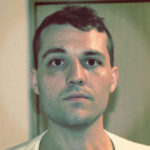 Massage is a novel about workers and working. It’s a novel that’s also a collection of interlocking short stories. These are stories that could be swapped by migrant workers over draft beer and tin plates of lamb skewers or turned into a motivational CCTV-1 piece on the Chinese Dream--or a powerful film like the one directed by Lou Ye in 2014. At the beginning of the novel, Wang Daifu, the blind massage therapist gives us the lay of the land from a tuina clinic in Shenzhen: there’s a pot of gold waiting, if you’re willing to risk everything.
Massage is a novel about workers and working. It’s a novel that’s also a collection of interlocking short stories. These are stories that could be swapped by migrant workers over draft beer and tin plates of lamb skewers or turned into a motivational CCTV-1 piece on the Chinese Dream--or a powerful film like the one directed by Lou Ye in 2014. At the beginning of the novel, Wang Daifu, the blind massage therapist gives us the lay of the land from a tuina clinic in Shenzhen: there’s a pot of gold waiting, if you’re willing to risk everything.
Wang Daifu, like many blind men and women in China, learned tuina, a traditional form of massage therapy. Wang Daifu completes his studies and heads off to Shenzhen, where he puts away a tidy nest egg. But he wants to take the next step and open up his own therapy center, so he risks his life savings on the Shenzhen and Shanghai indexes. After the market chews him up and spits him out, Wang Daifu flees to Nanjing, dragging along Xiao Kong, the love of his life. After a reunion with his classmate Sha Fuming, who has invested in a tuina clinic. It’s in Nanjing that the novel picks up speed. The setting is the dormitory of the therapy center and the characters are the blind tuina therapists. Among the half dozen therapists, there’s Du Hong, who captures Sha Fuming’s attention after a movie director lets the world know that she’s beautiful, and the handsome, haunted Xiao Ma, who cut his own throat after being struck blind in a traffic accident in childhood, and the flamboyant Jin Yan and the taciturn Xu Tailai, lovers that speak to each other in thick dialects from Shaanxi and northern Jiangsu, and Zhang Zongqi, Sha Fuming’s partner, who lost his eyesight during a botched medical procedure….
In my experience, most novels that report from the Chinese underclass are either literary exercises with little authenticity or pulpy reportage fiction that reads like a tabloid column. Bi Feiyu has written one of the finest novels of the last decade. The writing is fairly
restrained, as Chinese novels go. Although it’s sometimes sentimental, it never feels overwrought. It also rings authentic and avoids the trap of many Chinese novels, which gloss over the nitty-gritty of life with a handful of sentences that leapfrog the character from poverty
to wealth and back to poverty. Apart from being a sensational novel, this is one of the best, truest, most compassionate portraits of working life in contemporary China and has been rightly recognized for shining a light on the lives of the disabled and poor in the country.
The writers that came of age in the late-1980s and 1990s were the first in decades to not be immediately absorbed into the establishment. Just like any of the workers that were suddenly tossed into the deep-end of the reformed market, just like Wang Daifu looking for his pot of gold in Shenzhen, writers like Bi Feiyu became entrepreneurs. The wansheng dai, the “belated generation” or the “Latecomer Generation,” which included writers like Dong Xi, Shu Ping, Zhu Wen, Qiu Huadong, and Han Dong were often freelancers and usually unsupported by the state’s paychecks. (It’s no wonder that many of them -- including Bi Feiyu -- eventually turned to film and television and other media, where the money was better). When Bi Feiyu writes about working to put food on the table, there’s a reason it rings true.
Novels like Massage are the result of the breakdown of the old system that kept writers well-fed but fairly constrained. Although many of the belated generation have come in from the cold and joined the establishment, or even given up writing for paydays in other media,
the literary boom of the late-1990s and early-2000s gave us some of the most important works in contemporary world fiction. Even soaking in Chinese literature for a decade, Massage was a surprise to me. I can only hope it will help change the perception of Chinese
literature in the West.
Bi Feiyu also has the benefit of working with the premiere team in Chinese-English translation. For many readers of Chinese fiction in translation, it’s possible that Howard Goldblatt and Sylvia Li-chun Lin are the only translators that they have ever read. The two translators were--individually and as a team--responsible for the bulk of Chinese-to-English literary translations over the last three decades.
Although I have sometimes found Goldblatt and Goldblatt/Lin translations a bit fusty and archaic, having re-read much of what they’ve translated in the original, and having also attempted to make a living as a translator, actively picking apart the modern Chinese novel,
I’ve revised that opinion to: they never saved a bad novel. But when the source material is good, they have rarely failed the author. I always like to temper any criticism of Goldblatt and Lin by saying that their translation of Chu T'ien-wen’s Notes of a Desolate Man (Columbia University Press, 1999) with inspiring me to attempt my first translations from Chinese. The purity of Goldblatt and Lin’s translation works with source material as imaginative and well-written as Bi Feiyu’s fiction.
Dylan King, 25/9/17
Reviewed by Lin Su, 20/9/17
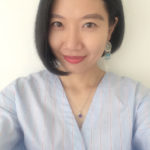 Bi Feiyu’s Massage opens at the turn of the century—as the world prepares itself to cross into the new millennium, gathering momentum for change and intimating reasons for hope. What unfolds, however, is a scene imploding with chaotic energy, born of a booming, deregulated free economy—“Go for the money! Go now, or you’ll miss out! It was as if the people had gone crazy. And when they went, money followed, which intensified the craze among the people. Madness can wear you out. Then what? Chinese-style tuina therapy is one of the better remedies.”Amidst this fervent pursuit of money appears Wang Daifu, a blind tuina practitioner whose real name we never learn in the novel (Daifu simply means "therapist"). The place is the late 1990s Shenzhen, China’s first special economic zone in its stride towards economic reform and modernization. Capitalizing on this golden era of entrepreneurship, the “swarms of bees”—the fortune-seekers from all corners of the earth (Hong Kong, Japan, America and of course, mainland China)—busy themselves with all kinds of money-making endeavors and when they tire themselves out, they find sanctuary in tuina centres operated by blind massage therapists like Wang Daifu.
Bi Feiyu’s Massage opens at the turn of the century—as the world prepares itself to cross into the new millennium, gathering momentum for change and intimating reasons for hope. What unfolds, however, is a scene imploding with chaotic energy, born of a booming, deregulated free economy—“Go for the money! Go now, or you’ll miss out! It was as if the people had gone crazy. And when they went, money followed, which intensified the craze among the people. Madness can wear you out. Then what? Chinese-style tuina therapy is one of the better remedies.”Amidst this fervent pursuit of money appears Wang Daifu, a blind tuina practitioner whose real name we never learn in the novel (Daifu simply means "therapist"). The place is the late 1990s Shenzhen, China’s first special economic zone in its stride towards economic reform and modernization. Capitalizing on this golden era of entrepreneurship, the “swarms of bees”—the fortune-seekers from all corners of the earth (Hong Kong, Japan, America and of course, mainland China)—busy themselves with all kinds of money-making endeavors and when they tire themselves out, they find sanctuary in tuina centres operated by blind massage therapists like Wang Daifu.
Presented with this historical opening for upward mobility, one wonders, does a physically disadvantaged person like Wang Daifu stand a chance to better his life? The answer is both yes and no. Dubbed by his colleagues as “the tycoon of massage therapists” because of his exceptional strength and skills, Wang Daifu is quick to accumulate a substantial amount of savings, which he then entrusts to the “invisible hands” of the stock market. Yet “the stock market did not do a somersault; it lay flat on the ground. It raised hell, it tumbled, it convulsed, it rolled its eyes, it foamed at the mouth—it did everything but stand.” Bi’s anthropomorphism underlines the immense frustration Wang Daifu feels not only at the loss of fortune, but also at the prospects of self-sufficiency, of owning a tuina centre himself.
Bi’s masterly craftsmanship is such that when he paints an impressive broad-stroke sociological sketch—for instance when he uncovers the deep-seated structural deprivation that is exacerbated by the introduction of foreign, exploitative financial system, entrapping the poor and the vulnerable in a vicious cycle, he is also mindful to include the microscopic and the sensory that allows for empathetic identification with the cohort of blind practitioners. We learn soon after Wang Daifu’s misfortune that his single-minded attempt to earn quick cash is not spurred by self-interest, rather, he only wants to free his girlfriend Xiao Kong from this labour-intensive business which has deformed her hands, making her even more of an “invalid.” Bi is also prescient in his knowledge of the readers’ desire to understand the day-to-day living of the blind practitioners. His portrait is not voyeuristic but full of sympathetic observations that reflects the exercising of individual agency in the way the sightless mobilize their remaining faculties to compensate for the lack of vision.
Bi keeps his gaze level. He neither condescends nor glorifies. As Wang Daifu is forced to relocate in the inland city Nanjing, rebuilding his career by working for his old colleague Sha Fuming who now runs the Sha Zongqi tuina centre, a colourful array of his fellow practitioners in the centre begin to appear under the limelight, each with unique, if slightly quirky, characters and interesting backgrounds. Not unlike the inn in The Canterbury Tales and the deserted villa in The Decameron, the Sha Zongqi tuina centre becomes the rendezvous point for the blind practitioners. Bi’s scrutiny of his characters is unflinching. One learns that while there’s natural camaraderie among the blind practitioners, there is also a strong mimetic desire to be like a “normal” person, a competitiveness to out-perform their blind brothers and sisters, and an inherent hierarchical system within the community no less severe than the one in the “normal” world.
Massage is a character-driven novel: all of its chapters adopt names of the characters as their titles and the unfolding of plot in the novel revolves around characters as they make entrance into the novel and takes the central stage. The individual plots are intertwined in the second half of the novel as the narrative flow quickens: romance clashing with business ambition for Sha Fuming, sexual maturation precipitating personal ruin for Xiao Ma and physical agony propelling search for independence for Du Hong.
Massage is an eye-opener for those interested in the less touched-upon aspects of contemporary Chinese life. The translated English version by Howard Goldblatt and Sylvia Li-chun Lin is incredibly easy to read. It flows naturally without losing the appeal of the elastic verve of Bi’s prose. I warmly recommend the novel to anyone who wishes to gain insight into the ethics of com-passionate looking (“with feelings”, in the old sense of the word).
Lin Su, 20/9/17
